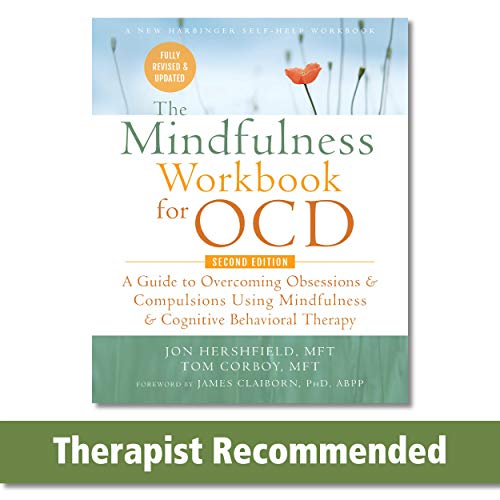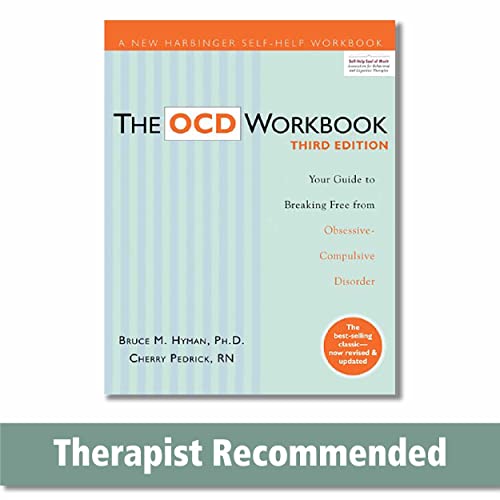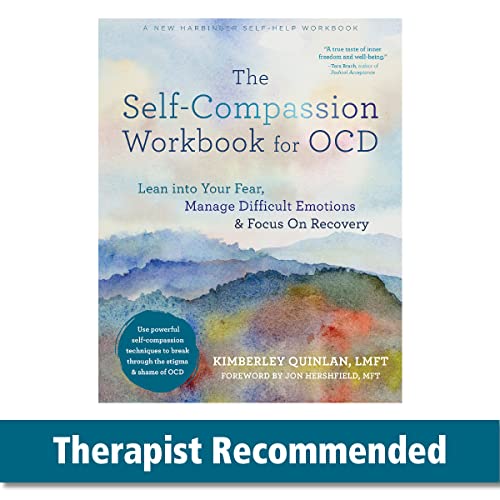Obsessive-compulsive disorder (OCD) is a condition that can be debilitating for sufferers. The constant intrusive thoughts and repetitive behaviors can make it difficult to function in everyday life. While there are many different treatments available for OCD, one that is often overlooked is ERP therapy.
ERP therapy, or exposure and response prevention therapy, is a cognitive behavioral therapy effective in treating OCD. The therapy works by helping the sufferer face their fears and control their reactions to anxiety-provoking thoughts and situations.
While ERP therapy may not be the right choice for everyone, it can be an effective treatment for many people with OCD. If you or someone you know is struggling with OCD, talk to a mental health professional about whether ERP therapy might be a good option.
| # | Preview | Product | Rating | Price | |
|---|---|---|---|---|---|
| 1 |

| The Mindfulness Workbook for OCD: A Guide to Overcoming... |
$24.95
$21.97 | Buy on Amazon | |
| 2 |

| The OCD Workbook: Your Guide to Breaking Free from... |
$25.95
$14.51 | Buy on Amazon | |
| 3 |

| The Self-Compassion Workbook for OCD: Lean into Your Fear,... | 257 Reviews |
$24.95
$21.11 | Buy on Amazon |
What Is Exposure And Response Prevention?
Exposure and response prevention (ERP) is a treatment for anxiety disorders that involves gradually exposing oneself to the fear-producing object, situation, or memory and learning to respond differently than with anxiety or fear.
Goal:
The goal is to eventually face the fear-producing object, situation, or memory without feeling anxious or having the urge to perform the compulsive behaviors often associated with anxiety.
ERP focuses on helping people to face their fears and to learn how to cope with anxiety-provoking situations more effectively. This therapy can be done in individual or group settings. It typically involves gradually exposing people to feared situations while helping them resist the urge to engage in avoidance or safety behaviors.
Examples: ERP Therapy For OCD
ERP therapy typically involves exposure to what triggers OCD symptoms, such as dirt or germs. The therapist will help the person gradually approach the anxiety-provoking situation. The therapist will also teach the person coping skills to deal with the anxiety.
ERP Therapy Duration
When a person suffers from anxiety-based disorders like OCD, it can be difficult to imagine ever feeling better. However, with the proper treatment, most people with anxiety can improve.
The duration of therapy for anxiety varies depending on the individual and the severity of their anxiety. For most people, treatment lasts between 10 and 20 sessions, with 45-60 minutes per session. However, some people may need more or less depending on their needs.
During therapy, people with anxiety will work with their therapist to identify the root cause of their anxiety and develop coping mechanisms. Therapy can be an effective treatment for anxiety, but finding a therapist you feel comfortable with and who feels a good fit for you is essential.
| # | Preview | Product | Rating | Price | |
|---|---|---|---|---|---|
| 1 |

| Clever Fox Self-Care Journal – Daily Reflection Notebook... |
$24.99 | Buy on Amazon | |
| 2 |

| The OCD Workbook: Your Guide to Breaking Free from... |
$25.95
$14.51 | Buy on Amazon | |
| 3 |

| Overcoming Unwanted Intrusive Thoughts: A CBT-Based Guide to... |
$18.95
$13.56 | Buy on Amazon |
Exposure And Response Prevention For Obsessive-Compulsive Disorder: A Review
Who Created ERP Therapy?
ERP therapy was developed in the 1970s by Stanley Robinson. He is considered to be the father of exposure therapy. Stanley Robinson developed several exposure-based treatments, but ERP therapy is the most well-known.
Does ERP Therapy Work?
There is no easy answer when it comes to the question of whether or not ERP therapy works. The success of any therapy depends on various factors, including the disorder’s severity, the patient’s dedication, and the therapist’s skill. That being said, a growing body of evidence suggests that ERP therapy can effectively treat OCD.
One of the most promising studies was conducted by the International OCD Foundation, which found that a success rate of 65% to 80% of patients who completed ERP therapy reported a significant reduction in OCD symptoms. While this study is encouraging, it’s important to remember that ERP therapy is not a cure for OCD. However, for many people with OCD, it can be a helpful tool in managing their condition.
Effectiveness Of ERP Therapy
Much research has been conducted on the effectiveness of ERP therapy for treating OCD. The results of this research are very encouraging, with most studies finding that ERP is an effective treatment for OCD.
One study found that ERP was more effective than medication in treating OCD (Freeman et al., 2014). Several studies have been conducted to assess the effectiveness of ERP therapy. Overall, the results of these studies suggest that ERP therapy is an effective treatment for anxiety disorders.
In one study, 64% of participants who received ERP therapy reported decreased anxiety symptoms. In another study, ERP therapy was more effective than relaxation training in reducing anxiety symptoms.
If you are considering ERP therapy for your anxiety disorder, working with a qualified therapist with experience treating it is essential. If you would like to learn more about ERP therapy, please get in touch with me. I would be happy to answer any questions you have.
However, it is essential to remember that everyone is different and will respond to treatment differently. Therefore, while ERP may be an effective treatment for OCD, it is not a cure. It is also important to note that ERP is not a quick fix and takes time and commitment to see results.
What Happens During ERP Therapy?
Depending on the severity of the individual’s symptoms, the therapist will then help them expose themselves to these triggers, either in imagination or real life.
ERP therapy is based on the principle that exposure to the things that trigger your anxiety can help you learn to control your response. Therefore, ERP therapy is typically done in a structured and controlled environment, such as a therapist’s office so that the exposure can be carefully monitored.
The therapist will work with you to gradually expose you to the things that trigger your anxiety, starting with the most minor anxiety-provoking situations and working up to the most anxiety-provoking ones.
ERP therapy is typically conducted on an outpatient basis but can also be performed on an inpatient basis, depending on the severity of the individual’s anxiety.
How Much Does ERP Therapy Cost
The average cost of ERP therapy in Bangladesh is 500tk-2000tk; for Western countries like the USA, it is $50-$200 per session, with most insurance companies providing coverage for this type of therapy.
How To Apply ERP Therapy?
To apply ERP therapy, the therapist first assesses the patient’s level of anxiety and determines what triggers the anxiety. The therapist then works with the patient to gradually expose them to the anxiety trigger while teaching them new coping skills.
The therapist may also help the patient identify and challenge the negative thoughts and beliefs contributing to the anxiety. ERP therapy aims to help patients manage their anxiety more effectively and reduce its impact on their lives.
ERP therapy is typically done with a therapist, but there are also self-help books and online resources that can help people learn and practice the techniques independently.
There are a few things to remember when applying ERP therapy for OCD.
First, it is essential to work with a therapist experienced in treating OCD.
Second, it is essential to be patient and consistent with the therapy.
Third, being open to trying new things and willing to challenge your beliefs about contamination is essential.
Finally, it is essential to remember that recovery is a process and that there will be setbacks. However, if you keep these things in mind, you will be on your way to recovery.
ERP Therapy For Contamination OCD
ERP Therapy For Contamination Ocd is an effective treatment for individuals with contamination OCD. This type of OCD is characterized by excessive fear of contamination and often results in avoidance behaviors.
ERP Therapy For Contamination Ocd helps individuals to gradually and systematically confront their fears in a safe and controlled environment. This exposure-based treatment is effective in reducing OCD symptoms and assisting individuals in leading more productive and fulfilling lives.
ERP Therapy For Religious OCD
If you or a loved one suffer from religious OCD, you may benefit from ERP therapy. OCD is an anxiety disorder that can cause sufferers to perform repetitive behaviors or have intrusive thoughts. In addition, religious OCD can cause sufferers to doubt their faith or fear blaspheming. ERP therapy can help sufferers to face their fears and learn to live with their OCD.
ERP Therapy For Existential OCD
Existential OCD is a type of OCD that is characterized by a fear of death, anxiety about the future, or a fear of the meaninglessness of life. This type of OCD can be debilitating and make it difficult for sufferers to live their everyday lives.
ERP Therapy is a type of therapy that is used to help people with Existential OCD. This therapy uses exposure and response prevention (ERP) to help people face their fears and learn to live with them. ERP Therapy is very effective in treating Existential OCD and can help people to lead an everyday and happy life.
ERP Therapy For ROCD
A new therapy is being used to help treat ROCD, and it is called ERP therapy. This therapy uses exposure and response prevention principles and effectively treats OCD.
It works because the person with ROCD is exposed to fear (e.g., thinking about a relationship). Then they are prevented from engaging in their usual response (e.g., compulsively checking their partner’s phone).
This process is repeated until the person with ROCD no longer needs to heck their partner’s phone compulsively. If you or someone you know is struggling with ROCD, please consider seeking ERP therapy.
Sometimes, psychological symbol gifts can make strong relationship bonding.
ERP Therapy For Tics
ERP therapy is a type of behavior therapy that uses positive reinforcement to help people with tics reduce the frequency and intensity of their tics. The therapy is based on the principle that people are likelier to repeat behaviors associated with positive outcomes.
In ERP therapy, patients are rewarded for reducing the frequency or intensity of their tics. The rewards can be tangible, such as stickers or points that can be redeemed for prizes, or intangible, such as praise or positive feedback from the therapist. Erp therapy effectively reduces tics in people with Tourette syndrome and other tic disorders.
ERP Therapy For Hoarding
ERP therapy for hoarding is a treatment that helps people with hoarding disorder manage their symptoms and regain control of their lives.
The therapy focuses on changing the person’s thinking and behavior patterns and helping them to develop new, healthier ways of dealing with their belongings.
ERP therapy can effectively treat people with hoarding disorder and help them lead happier, more fulfilling lives.

ERP Therapy For Retroactive Jealousy
Retroactive jealousy can be a difficult thing to deal with. But there is help available in the form of ERP therapy. This therapy can help you deal with your retroactive jealousy more constructively. It can help you to understand your jealousy and to learn how to deal with it more healthily.
ERP therapy can also help you to communicate better with your partner and to build stronger relationships. If you are struggling with retroactive jealousy, consider seeking ERP therapy to help you deal with it more positively.
ERP Therapy For Health Anxiety
ERP therapy is a cognitive-behavioral therapy that is effective in treating health anxiety. The therapist works with the patient to help them identify and challenge their negative thoughts and beliefs about their health.
The therapist also teaches the patient relaxation and stress management techniques. As a result, ERP therapy is effective in reducing health anxiety and improving quality of life.
Why Is ERP Therapy The Recommended Treatment For OCD?
There are several reasons why ERP therapy is the recommended natural treatment for OCD.
First, ERP is effective in treating OCD.
Second, ERP is a relatively short-term treatment, making it less likely to cause adverse effects.
Third, ERP is a relatively low-cost treatment, which makes it more accessible to patients.
Finally, ERP is a highly individualized treatment that can be tailored to each patient’s specific needs.
What To Look For In A Therapist Who Uses ERP
When looking for a therapist to help you with your OCD, it is essential to find one specializing in Exposure and Response Prevention (ERP). This therapy has been proven to be the most effective in treating OCD.
- Look for a therapist experienced in treating OCD with ERP, which has a success rate with their patients.
- Make sure to ask about the therapist’s experience with treating OCD and about their success rate.
- Also, ask if the therapist is a Licensed Clinical Social Worker (LCSW) or a Licensed Professional Counselor (LPC).
These therapists have specialized training in treating mental health disorders and are more likely to be familiar with ERP.
How Is ERP Different From Traditional Psychotherapy?
ERP focuses on helping people identify and change the thoughts and behaviors contributing to their anxiety.
Unlike traditional psychotherapy, ERP is specifically designed to treat anxiety disorders and uses a structured approach that includes exposure and response prevention.
ERP, or exposure and response prevention, differs from traditional psychotherapy in several ways.
First, ERP focuses on the present moment and helps individuals identify and challenge their irrational thoughts and beliefs about their anxiety-provoking situation or object.
Second, ERP requires the individual to face their fears head-on by engaging in exposure exercises, which can be done in-vivo (real life) or imaginal (in mind).
Finally, ERP is a more active form of treatment, as it involves the repeated practice of exposure and response prevention techniques outside of the session.
Everything You Need To Know About Exposure and Response Prevention Therapy
Can You Do ERP Therapy On Your Own?
Undoubtedly, ERP therapy can effectively treat OCD, but can you do it yourself? Unfortunately, the simple answer is no.
ERP therapy is a structured, specific form of cognitive-behavioral therapy that requires the guidance of a trained professional. That being said, there are some things you can do on your own to start working on your OCD.
Reading about ERP and other forms of CBT can help you understand the basics of the treatment and how it can help you.
Additionally, many self-help books and online resources can provide support and guidance.
However, if you genuinely want to benefit from ERP, you must work with a therapist who can tailor the treatment to your specific needs.
ERP Therapy For Eating Disorders
ERP, or exposure and response prevention, is a cognitive behavioral therapy often used to treat eating disorders. This therapy focuses on helping individuals identify and challenge their distorted thoughts and beliefs about food and their body. ERP aims to help individuals develop more realistic and healthy relationships with food and their bodies. This therapy can treat anorexia nervosa, bulimia nervosa, and binge eating disorder.
ERP Therapy For Social Anxiety
ERP, or exposure and response prevention therapy, is very effective for social anxiety. ERP involves gradually exposing yourself to what makes you anxious and learning to respond differently. This can help you feel more comfortable in social situations and enjoy your life more.
ERP Therapy For PTSD
ERP therapy helps people with PTSD by teaching them how to manage and cope with their symptoms. The therapy focuses on exposure to the traumatic event and helps the person to process and work through their feelings about what happened.
ERP therapy is an effective treatment for PTSD and can help people to recover from their trauma and live an everyday, productive life.
ERP Therapy For Agoraphobia
Exposure and response prevention therapy helps people with agoraphobia confront their fear of panic attacks and other anxiety-related symptoms. ERP therapy aims to help people become less afraid of their symptoms and learn to manage their anxiety more constructively.
ERP therapy usually involves gradually exposing the person to the situations they fear and teaching them coping skills to deal with their anxiety.
ERP Therapy Autism
There is much debate surrounding the effectiveness of ERP therapy for autism. However, many experts believe this therapy can benefit those with autism.
ERP therapy can help to change negative thinking patterns and behaviors associated with autism. This type of therapy can also help to improve communication and social skills.
While ERP therapy may not cure autism, it can help improve the quality of life for those with the condition.
In Conclusion, the ERP results show results. A patient showed significant improvement with ERP Therapy. His symptoms, medication use, anxiety, and symptoms were significantly better. Furthermore, ERP Therapy was well tolerated, and the patient reported improved mood, sleep, and concentration.
You may also like
- Best 10 Books on Self Discipline
- Best Books on Behavioral Psychology
- Best Stress Reliever Gifts for OCD People
Last update on 2024-07-22 / Affiliate links / Images from Amazon Product Advertising API

